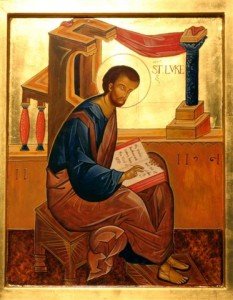 The next book that must be considered in a chronological New Testament (NT), is the Gospel of Luke. The gospel of Luke and the Acts of the Apostles belong, as many already know, together. They were written, scholars tell us, by the same person and share unifying themes, which suggests that the author conceived them as a single work contained in two volumes. But for about 1,700 years, they have been separated by the Gospel of John. Why? Simply because the canonical NT places all four gospels first.
The next book that must be considered in a chronological New Testament (NT), is the Gospel of Luke. The gospel of Luke and the Acts of the Apostles belong, as many already know, together. They were written, scholars tell us, by the same person and share unifying themes, which suggests that the author conceived them as a single work contained in two volumes. But for about 1,700 years, they have been separated by the Gospel of John. Why? Simply because the canonical NT places all four gospels first.
That Luke and Acts were written by the same person is obvious from their introductions. Both are addressed to Theophilus. Moreover, the first verse of Acts refers back to the gospel: In the first book, Theophilus, I wrote about all that Jesus did and taught from the beginning. The name could refer to an individual – but it also means lover of God, so it could be addressed to a group, namely, the God-lovers.
Their thematic unity is apparent. One major theme is the geographical progression of the Jesus movement from Galilee to Jerusalem, the center of Judaism and then from Jerusalem to Rome, the center of the empire.
A second major theme is their common emphasis on the Spirit. In the gospel, Jesus is conceived by the Spirit; then the Spirit descends upon him at His baptism; and the first words of his public activity are: The Spirit of the Lord is upon me. His last words from the cross are, Into your hands I commend my spirit. The Spirit of God that animated Jesus returns to God, and the gospel ends with the promise that the Spirit will descend upon his followers.
That promise is fulfilled in the opening chapters of Acts with the descent of the Spirit upon the community at Pentecost. Throughout the rest of Acts, the Spirit guides and leads the expansion of the Jesus movement from the homeland to the ends of the earth.
Many scholars discern in the Lucan gospel and Acts an apologetic strain presumably directed against unfounded criticisms of Christian teaching. Written after the persecution of Nero that began in 64 C.E. and caused hostility toward Christians throughout the empire. Luke-Acts reveal that Jesus Himself was accounted innocent by the Roman governor Pontius Pilate and that St. Paul, founder of many Christian communities in the empire, was often acquitted by the Roman magistrates of charges against him. He was a Roman citizen.
